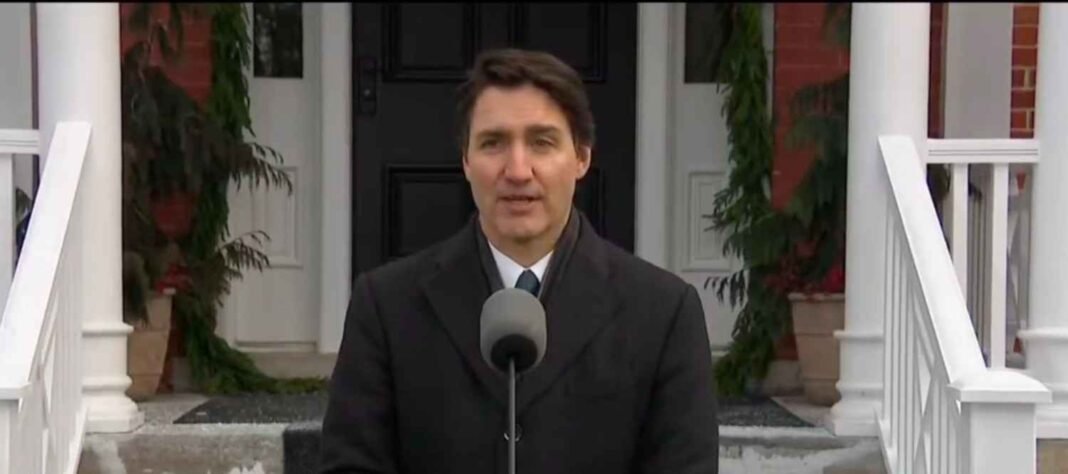In a significant escalation of trade tensions, Canadian Prime Minister Justin Trudeau declared on Saturday that his government would impose retaliatory tariffs of 25 percent on American goods valued at approximately 155 billion Canadian dollars. This response comes in light of U.S. President Donald Trump’s recent decision to implement similar tariffs on all imports from Canada, effective Tuesday.
During a press conference, Trudeau emphasized that these tariffs violate the principles of the free trade agreement established between the two nations. “Tariffs will have real consequences for the American people,” he stated, outlining that immediate tariffs would target $30 billion worth of U.S. goods starting Tuesday, with an additional C$125 billion in tariffs to follow in 21 days.
Trudeau acknowledged the challenging times ahead for both Canadians and Americans, stating, “The next few weeks will be difficult for Canadians and Americans.” He also mentioned that his government is exploring various non-tariff measures, particularly concerning critical minerals, energy procurement, and other partnerships.
The backdrop to this trade conflict is Trump’s executive order, which imposes a 10 percent tariff on all imports from China and a 25 percent tariff on imports from Canada and Mexico. Notably, energy imports from Canada, including oil, natural gas, and electricity, will be taxed at a lower rate of 10 percent. The executive order includes provisions for escalating tariffs if Canada and Mexico retaliate.
“This trade action by the Americans and our response is going to have real consequences for people and for workers on both sides of our border,” Trudeau remarked. “We don’t want to be here; we didn’t ask for this. But we will not back down in standing up for Canadians.”
In a tweet following Trump’s announcement, Trudeau indicated that he would be in communication with Mexican President Claudia Sheinbaum and had already met with Canadian premiers to discuss the unfolding situation. “We did not want this, but Canada is prepared,” he added.
Mexico has also announced its own retaliatory measures against the U.S. President Sheinbaum stated, “Nothing by force; everything by reason and right,” as she outlined Mexico’s response to the tariffs.
Prior to Trump’s executive order, Trudeau had warned of a “forceful and immediate response” if the U.S. proceeded with its tariff plans. “No one — on either side of the border — wants to see American tariffs on Canadian goods… We’re working hard to prevent these tariffs, but if the U.S. moves ahead, Canada’s ready with a forceful and immediate response,” he tweeted.
Ontario Premier Doug Ford criticized the tariffs, asserting that Canada had no choice but to retaliate. “Canada has so much of what America needs: high-grade nickel and other critical minerals, energy and electricity, uranium, potash, aluminium. We need to maximize our points of leverage and use them to maximum effect,” he stated. Ford also urged the federal government to pursue all legal avenues to challenge what he termed “unfair, unjustified and illegal tariffs.”
In a more immediate response, Nova Scotia’s Premier Tim Houston announced that all alcohol imported from the U.S. would be removed from the province’s store shelves.
Mexican President Sheinbaum, while remaining calm, expressed her discontent with Trump’s tariffs. “We categorically reject the White House’s slander against the Mexican government of having alliances with criminal organizations,” she stated. She emphasized that problems should be resolved through dialogue rather than tariffs, and instructed her Secretary of Economy to implement a “Plan B” that includes both tariff and non-tariff measures to protect Mexico’s interests.
Trump’s decision to impose tariffs on Canada and Mexico is part of a broader strategy he pledged to pursue upon returning to the White House, despite warnings of a potential trade war that could disrupt global economic growth. Following his victory in the November 2024 presidential election, Trump reiterated his commitment to impose a 25 percent tariff on both countries, linking it to issues such as illegal immigration and drug trafficking.
“Mexico must stop illegal aliens from crossing its border with the U.S., and Canada must halt the flow of drugs like fentanyl. Until such time as they do, it is time for them to pay a very big price!” Trump declared.
On Saturday, after a lengthy golf outing in Florida, Trump signed three separate executive orders to implement the tariffs, vowing to maintain them until what he described as a national emergency regarding fentanyl and illegal immigration is resolved. A White House fact sheet indicated that the tariffs would remain in place “until the crisis alleviated,” but did not specify the conditions under which the three countries could expect relief.
As the situation unfolds, both Canada and Mexico are bracing for the economic implications of this trade conflict, with leaders on both sides of the border preparing for a protracted standoff that could have lasting effects on North American trade relations.









